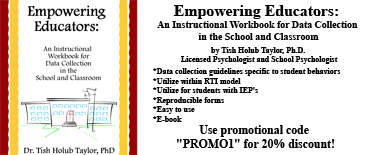| Dear NASET Members: Welcome to NASET's WEEK in REVIEW. Here, we provide you with the latest publications from NASET to read and download, as well as some of the most interesting issues that have happened this week in the field of special education. We hope you enjoy this publication. Feel free to send us articles for this publication or let us know your thoughts about the WEEK in REVIEW at news@naset.org. Have a great weekend.
Sincerely,
NASETNews Team |
| New This Week on NASETThe Practical TeacherTransforming Schools from Bully-Havens to Safe HavensBullies are opportunistic, preying upon students whom they perceive as weak. Bullying cannot take place, though, unless the bully has a setting or location in which he or she is able to exploit and hurt the victim. The far corner of a classroom, a deserted hallway, the bathroom: these are all locations in which bullying may happen. Places where bullying is common are frequently deserted or poorly supervised. The good news, though, is that when adults are present to supervise a particular setting, intervene quickly when they witness bullying behavior, and provide fair and appropriate consequences to the bully for his or her misbehavior, the rate of bullying in that setting will plummet. The focus of this issue of NASET's Practical Teacher is to show how teachers can work with other school staff to put locations off-limits to bullies by first identifying where bullying most often occurs in the school and then providing increased levels of trained adult supervision in those settings. To read of download this issue - Click Here (login required) ________________________________________________________________
Parent Teacher Conference HandoutsWhat Parents Need to Know About Assistive TechnologyThere will be many times when a teacher recommends assistive technology to assist a student in the classroom. Assistive technology can be of significant importance in the student's ability to succeed in school. Many parents may be unfamiliar with this special education option. The purpose of this Parent Teacher Conference Handout is to provide a basic foundation of assistive technology for parents. To read or download this issue - Click Here ( login required) |
| NASET Sponsor - Empowering Educators 
|
| 'Day Of The Special Educator' Recognized In CaliforniaSpecial educators throughout the state of California were honored on December 3, 2009, as districts around the state celebrated the Day of the Special Educator. CARS+, the California Organization for Special Educators, sponsored the day along with support from the California School Board Association (CSBA), California Teachers Association (CTA), Family Empowerment Centers, Parent-Teacher Association (PTA), and the newly formed Special Education Collaborative. On December 2, 1975, President Gerald Ford signed Public Law 94-142 which ensured a free appropriate public education (FAPE) to all students with disabilities. Not wanting to detract from the students for who this law was written, CARS+ chose December 3rd as the day to honor those educators who advocate for the rights and services that special needs students need and to make sure that they have access to FAPE. Marci Marino, a parent of a student with disabilities, commented "without the dedication of my son's special education teacher, he would not be able to succeed in school. All special educators deserve to be honored for the important work they do." This sentiment was echoed throughout the state. Activities were held at local and regional levels to celebrate the work that is done by dedicated special educators who deliver more than just curriculum to the students on their caseloads. CARS+, and other special education advocates in California, are hoping that the Day of the Special Educator will occur every year and in every state. |
| Cardiovascular Risk In Youth With Type 1 Diabetes Linked Primarily To Insulin ResistanceAccording to a new study accepted for publication in The Endocrine Society's Journal of Clinical Endocrinology & Metabolism (JCEM), youth with type 1 diabetes have now been found to have abnormal insulin resistance. Having abnormal insulin resistance appears to negatively affect heart, blood vessel and exercise function in this population. Type 1 diabetes often begins in childhood. Patients with type 2 diabetes have their insulin resistance measured routinely, but this is currently not common practice in treating patients with type 1 diabetes--especially those with normal weight. Because insulin resistance is known to contribute to cardiovascular disease in type 2 diabetes researchers in this study investigated whether insulin resistance has a similar effect on adolescents with type 1 diabetes. To read more, click here |
| N.J. Senate Committee Approves Anti-Discrimination Bill For Adults With AutismNew Jersey adults with autism would gain anti-discrimination rights and the ability to enroll in a statewide tracking registry under legislation approved in a Senate committee today. Both bills were endorsed by the state Adults with Autism Task Force, and they won support from an Assembly committee last month. Autism is a neurological disorder that can cause behavioral, social and cognitive problems. Federal studies have shown it is more prevalent in New Jersey than in any other state. The first measure would expand anti-discrimination laws to include people with autism and related developmental disorders. Such laws allow individuals with mental and physical handicaps equal access to housing, employment and public accommodations. To read more, click here |
| NASET Member Benefit - Group Savings Plus from Liberty Mutual 
As a member of NASET you qualify for a special group discount* on your auto, home, and renter's insurance through Group Savings Plus® from Liberty Mutual. This unique program allows you to purchase high-quality auto, home and renters insurance at low group rates. See for yourself how much money you could save with Liberty Mutual compared to your current insurance provider. For a free, no-obligation quote, call 800-524-9400 or visit www.libertymutual.com/naset, or visit your local sales office Group discounts, other discounts, and credits are available where state laws and regulations allow, and may vary by state. Certain discounts apply to specific coverage only. To the extent permitted by law, applicants are individually underwritten; not all applicants may qualify. Coverage provided and underwritten by Liberty Mutual Insurance Company and its affiliates, 175 Berkeley Street, Boston, MA. |
| Department Of Justice Releases Statistics For Crimes Against Persons With DisabilitiesThe Department of Justice has just published a report on a study of "the victimization experiences of persons with disabilities," which includes comparisons with the victimization rates of persons without disabilities. The statistics released in the report indicate that persons with disabilities older than twelve experienced approximately 716,000 non-fatal violent crimes and 2.3 million property crimes in 2007. The report found that persons with disabilities experienced strikingly higher rates of violence than persons without a disability. The difference was even greater for persons aged twelve to nineteen with disabilities who were nearly twice as likely to be victims of a violent crime as persons without a disability. To read more, click here |
| NASET MEMBER'S BENEFIT (optional)
To learn more about Health Proponent - Click Here Be sure to mention that you are a member of NASET for special plan and pricing! |
| New Gene Findings Will Help Guide Treatment In Infant LeukemiaPediatric oncologists have identified specific genes, dubbed partner genes, that fuse with another gene to drive an often-fatal form of leukemia in infants. By more accurately defining specific partner genes, researchers expect to better predict which infants may benefit from particular treatments. Oncologists also aim to use this latest knowledge to develop new and more effective therapies for this difficult-to-treat type of blood cancer, called acute lymphoblastic leukemia (ALL). Their goal is to target treatments to specific genes and other associated factors that become abnormal because of the gene fusions. To read more, click here |
| Students Teach Each Other In Inclusive ClassesSouth Elementary students with special needs are included in regular education classrooms throughout the building and yielding positive test results. Principal Lois Mays said recent test scores show academic gains for all students and especially for special education students, who receive teacher and peer support in the classroom. "We have two teachers in the classrooms to help the students," Mays said. "We're not pulling anyone out of the classrooms anymore; we're using inclusion." Inclusion is the practice in which special needs students remain in a regular education classroom to learn grade-level instruction. Mays touted the practice, saying it helps with student self-esteem and model behavior among the children. In Ronda Cooper's third-grade classroom, students helped each other solve math problems and praised each other for answering correctly. To read more, click here |
| Study Links Factors To Choice Of Infant Sleep PositionResearchers funded by the National Institutes of Health have identified three principal factors linked to whether caregivers place infants to sleep on their backs. Those three factors are: whether they received a physician's recommendation to place infants only on their backs for sleep, fear that the infant might choke while sleeping on the back, and concerns for an infant's comfort while sleeping on the back. A large body of research has shown that placing infants on their backs to sleep reduces the risk of Sudden Infant Death Syndrome (SIDS), the leading cause of death during the first year of life in the United States. "Placing infants on their backs for sleep remains the single most effective means we know to reduce the risk of sudden infant death syndrome," said Marian Willinger, Ph.D., Special Assistant for SIDS research at the Eunice Kennedy Shriver National Institute of Child Health and Human Development (NICHD), which funded the analysis. "For the vast majority of infants, concerns about choking while back sleeping are unfounded." To read more, click here |
| NASET Offering Members Two Million Dollar Educator's Liability InsuranceEvery day, special educators are faced with the stresses and potential liability issues involved in dealing with children with special needs. As a result you may be vulnerable to lawsuits, which have been on the rise over the last few years, from parents, or students themselves. In the past decade, the number of suits filed against educators and administrators has risen dramatically, causing the cost of insurance to increase as well. While some special educators may feel that they do not need this type of coverage and they are protected by their district, they should think twice. Even if you are 100% innocent of the charges or accusations, legal costs alone could run into the thousands and sometimes tens of thousands of dollars. In special education today, parents - and students - are more aware of their rights, and the laws that govern special education and hold teachers/educators to high standards. Don't try to convince yourself that the expense of your professional and public liability protection is unnecessary or unjustified. Experience shows that the cost of such coverage is by far lower than the risk a teacher takes by not having such protection. Why take a chance for less than $10.00 a month? To learn more about educator liability insurance available through NASET and our partnership with the Association of American Educators (AAE), click here |
| Hyperactivity Associated With Shorter Nights For Young BoysHyperactive boys don't get enough sleep, which can worsen their condition according to new research. Published in the November issue of Pediatrics, the study is the first to examine a large sample of children and to study the link between lack of sleep and hyperactivity. As part of the investigation, 2057 mothers answered yearly questionnaires concerning sleep duration and hyperactivity of their children. Data was collected until kids reached five years of age and was analyzed by a team of scientists from the Université de Montréal, its affiliated Hôpital du Sacré-Cœur de Montréal and Sainte Justine University Hospital Research Center, as well as the Université Laval and the French National Institute for Health and Medical Research (INSERM). To read more, click here |
| Puppets Push Caring To Local YouthLocal children visiting the Fort McMurray Public Library this week are learning to understand differences and disabilities with the use of special books and puppets. Yesterday was the United Nation's International Day for Disabled Persons and to raise awareness among local children, the library partnered with the Fort McMurray Association for Community Living to deliver programming addressing different disabilities. The program featured The Kids on the Block Inc. puppet show, Understanding Differences, on Tuesday and yesterday. "The kids really enjoyed it," Sherry Legge of the library's children's services department said after yesterday's show. "The Association for Community Living had these great puppets that they really didn't get to use, so they gave them to us for this event. Some of the scripts were a little out-dated so we ordered new ones and they came in about a month ago." Co-worker Marylin Pohlmeier said the pair had less than a month to prepare for the event, but felt it went over really well. To read more, click here |
| Mice Holding Back Muscular Dystrophy Research?Humans and mice have previously unknown and potentially critical differences in one of the genes responsible for Duchenne muscular dystrophy (DMD). Researchers writing in the open access journal BMC Biology have found that two major features of a key DMD gene are present in most mammals, including humans, but are specifically absent in mice and rats, calling into question the use of the mouse as the principal model animal for studying DMD. Roland Roberts led a team of researchers from King's College London, UK, and was funded by the Muscular Dystrophy Campaign. The team made the discovery while studying α-dystrobrevin, a component of the dystrophin protein complex that is disordered in DMD. Roberts said, "Two previously unrecognized features (a gene switch or promoter and a novel binding site for the adaptor protein syntrophin) are encoded by the α-dystrobrevin gene of almost all four-legged animals except mice. We assume that this tardy recognition of key features of a gene that has been intensively studied since its discovery 13 years ago is due to the predominance of the mouse as the model organism for studying DMD and the specific destruction of these parts of the gene in the mouse." To read more, click here |
| FDA Approves Lilly Antipsychotic For TeensDrugmaker Eli Lilly & Co. said Friday it received U.S. approval to market its best-selling medication Zyprexa for adolescents with schizophrenia and manic depression. The Food and Drug Administration approved the drug for adolescents aged 13 to 17 years old, but cautioned that the drug can cause weight gain and high blood sugar in younger patients.
New labeling for the drug will recommend physicians consider other treatments first, according to a statement from Lilly. Zyprexa was Lilly's top-selling medication last year with sales of $4.7 billion. Earlier this year a medical study found that youngsters are more prone to gain weight when taking antipsychotics drugs than adults. The study in the Journal of the American Medical Association found children and teens can gain nearly 20 pounds and become obese within just 11 weeks. To read more, click here |
| Study Finds Teens With Learning, Emotional Disabilities More Likely To Miss School, Drop OutHigh absence rates among students with disabilities in Chicago's public high schools are the largest factor explaining the difference in their academic performance when compared with non-disabled peers, according to a new research report. Specifically, the Consortium on Chicago School Research found that students with mild cognitive disabilities missed five more days per semester than students who hadn't been diagnosed with a disability. Students with emotional disturbances were absent on average 11 more days than those without, the report found. It's unclear whether the higher number of absences cause a drop in performance or whether low performance means students are more likely to be disengaged and miss school. To read more, click here |
| Food for Thought........Character, not circumstances, makes the person.
Booker T. Washington |
|